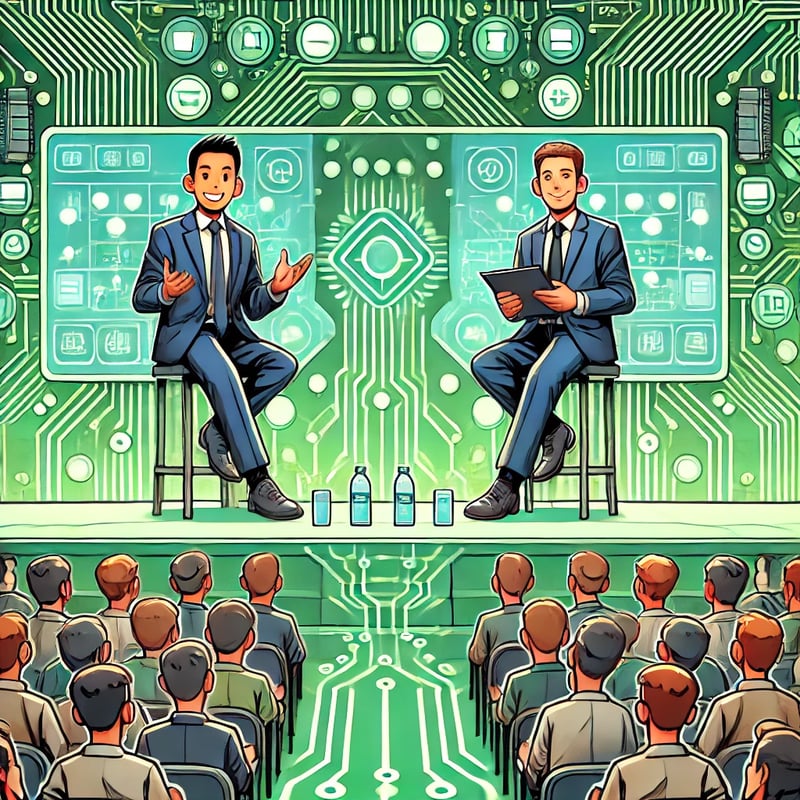Jensen Huang’s Conversation with David Solomon: NVIDIA’s Journey and Future Vision
@business
8 months ago

Jensen Huang’s Conversation with David Solomon: NVIDIA’s Journey and Future Vision
David Solomon (CEO of Goldman Sachs) and Jensen Huang (CEO of NVIDIA) had an insightful discussion during a technology talk organized by Goldman Sachs. The conversation took place on the evening of September 11th, Pacific Time and covered NVIDIA’s incredible journey from its founding in 1993 to becoming a $3 trillion company and a key player in AI and computing.
David Solomon: Jensen, you’ve been a pioneer in accelerated computing since founding NVIDIA in 1993. The company revolutionized the PC gaming market with the invention of the GPU in 1999, redefining computing and igniting the modern AI era. With degrees from Oregon State University and Stanford University, you’ve had an extraordinary journey.
Let’s go back to 31 years ago, when you founded the company. NVIDIA evolved from a gaming-focused GPU company into one that now provides hardware and software for data centers. Could you walk us through that journey? How did your vision evolve, and what were some key milestones along the way? Also, looking forward, what are your priorities for the future?
Jensen Huang: One of the things we did right from the start was having a clear vision that a new kind of computing was needed—one that could complement general-purpose computing and solve problems it couldn’t. We started with computer graphics, a task that was extremely challenging for CPUs, but we always knew the potential for expansion into other areas.
Our first step was image processing, which complemented graphics. Then we expanded into physics simulations because, for video games, you don’t just need beautiful images; you need dynamic effects to create virtual worlds. This led us into scientific computing, and we developed early applications in molecular dynamics simulation and seismic processing—essentially inverse physics.
Our core idea has always been that accelerated computing could solve interesting problems. And we've stayed true to a consistent architecture since 1993, ensuring that software developed today can run on the foundation of past hardware. This consistency is why CUDA, our parallel computing platform, has such a massive install base—we’ve always protected developers' investments in it.
Looking ahead, we’ve learned a lot along the way, not just about leading a company but also about inventing entire industries like modern gaming. GeForce, for example, powers 300 million gamers and continues to thrive.
David Solomon: Let’s dive into the difference between general-purpose computing and accelerated computing.
Jensen Huang: When you look at software, you’ll find a lot of it is data input/output and setting up structures, but the magic is in the core algorithms. These algorithms differ based on the field—whether it's computer graphics, fluid dynamics, or image processing.
If you create a processor that excels in specific algorithms and complements what CPUs can’t do, you can accelerate applications by 100x or more. For instance, we’ve accelerated image processing by 500x. Data processing is another favorite application, especially for machine learning, where everything is data-driven.
To make these accelerations possible, we had to create libraries—like CuDNN for neural networks, CuOpt for optimization, and CuQuantum for quantum simulations. Once you use these libraries, you can get 100x or more acceleration.
David Solomon: I know many investors here are keen to hear your thoughts on the data center market and its long-term potential. What are some challenges, and how do you see this market evolving?
Jensen Huang: Two major dynamics are happening right now. First, general-purpose computing has hit a bottleneck with the end of Moore’s Law—we’re no longer seeing performance doubling every year as we did before. That’s why accelerated computing is critical.
Data centers need to modernize, increasing density and becoming more energy efficient. NVIDIA’s high-density servers might seem costly, but they replace thousands of older nodes. By increasing density, we also make it easier to switch to liquid cooling, which is far more efficient. That’s our focus for the next decade—accelerating and modernizing data centers.
Secondly, the rise of AI has changed everything. Accelerated computing has brought a million-fold increase in computing power over the past decade. This allows us to automate processes like writing software with AI.
David Solomon: You’ve mentioned NVIDIA’s competitive edge before. How do you view your advantages in a landscape where many companies are vying for dominance?
Jensen Huang: One key difference is that AI is more than just hardware—it’s about infrastructure. When building AI systems like Blackwell, it’s not just about assembling chips; it’s about constructing an entire data center optimized for AI workloads.
AI is also about understanding algorithms. We specialize in allocating computing workloads across millions of processors to achieve energy efficiency and performance.
Lastly, consistency in architecture is crucial. Whether on a personal computer or a supercomputer, having a unified architecture that runs the same software is a huge advantage. This consistency is why NVIDIA’s architecture is the go-to choice for many.
David Solomon: You’ve been innovating at an incredible pace. Can you keep up this momentum? How do your partners manage to keep up with NVIDIA’s rapid advancements?
Jensen Huang: Our innovation speed is based on a strategy of developing seven different chips, each with a two-year lifecycle. This allows us to release a better AI system every year. The performance increases directly benefit our customers by reducing costs and boosting profits.
David Solomon: Given the geopolitical landscape, how do you view NVIDIA’s reliance on suppliers in Asia, particularly Taiwan?
Jensen Huang: The supply chain is deeply intertwined, and building an NVIDIA system is incredibly complex—it’s like building an electric car. We’ve designed as much redundancy and flexibility as possible, allowing us to adapt when necessary.
Taiwan, particularly TSMC, plays a pivotal role in our supply chain because they are the best at what they do. They have a long history of being responsive, and they helped us scale rapidly when demand surged.
David Solomon: What worries you the most right now?
Jensen Huang: The immense responsibility we bear. Everyone depends on us—customers, partners, the entire tech ecosystem. There’s a lot of emotional weight when you know so many people are counting on you. But we’re working hard to meet that demand, especially as we scale production of Blackwell. The pressure is intense, but it’s also thrilling to be leading the next era of computing.
You may also like:
D o you want to connect with people who share your interests, passions, and goals? Do you want to express yourself, showcase your talents, and discover new opportunities? Do you want to enjoy a safe and enjoyable platform that offers everything you need for your daily computing needs? If you answered yes to any of these questions, then you should join NXplan.com, the new all-in-one social platform that features blog, messaging, chat, inbox, and marketplace.
NXplan.com is more than just a social network.
It’s a social ecosystem that allows you to create, communicate, and collaborate with others in a variety of ways. You can:Create your own blog and share your thoughts, opinions, and experiences with the world. You can also follow other bloggers and get inspired by their content. Message your friends and family and stay in touch with them. You can also make new friends and join groups that match your interests.
Chat with other users and have fun conversations. You can also join live events and webinars and learn from experts and influencers. Manage your inbox and organize your emails. You can also send and receive files, photos, and videos with ease. Explore the marketplace and find products and services that suit your needs. You can also sell your own products and services and earn money.
NXplan.com is designed to provide you with a safe and enjoyable platform that respects your privacy and security.
You can: Control your own data and decide who can see and access your information. Report and block any abusive or inappropriate content or users. Enjoy a spam-free and ad-free environment that does not track or sell your data. Access the platform from any device and any browser, without any downloads or installations. NXplan.com is free to join and use, and you can get started in minutes. All you need is a valid email address and a password. You can also customize your profile and settings to make it your own.Ready to give it a try?
Join NXplan.com today and discover a new way of socializing online. You’ll be amazed by what you can do and who you can meet on NXplan.com. Don’t miss this opportunity to join the next big thing in social media. Register now and start your NXplan journey.Technology is nothing. What's important is that you have a faith in people, that they're basically good and smart, and if you give them tools, they'll do wonderful things with them




